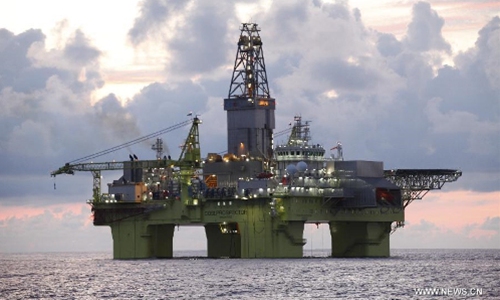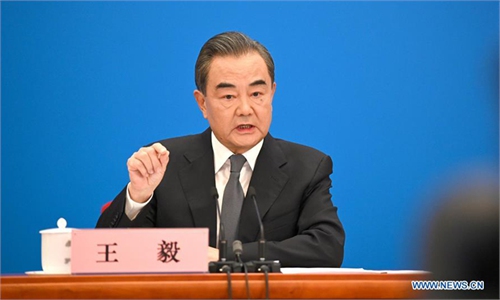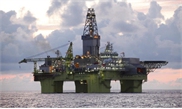CNOOC makes breakthrough in deep water gas field exploitation
CNOOC makes breakthrough in deep water gas field

Photo taken on June 13, 2015 shows the Xingwang deep-sea semi-submersible drilling platform at Liwan3-2 gasfield in the South China Sea, south China. China's largest offshore oil and gas producer CNOOC Ltd. announced on July 3, 2015 that its Xingwang deep-sea semi-submersible drilling platform has started drilling at 1,300 meters underwater level in Liwan 3-2 gas field in the South China Sea. (Xinhua/Zhao Liang)
A submarine pipeline at a depth of 1,542 meters on the south side of the E3-E2 sections of the Lingshui 17-2 gas field has been successfully completed, marking a breakthrough for China in deep water natural gas exploitation in the South China Sea.
The Lingshui 17-2 gas field - the first deep water field established by a Chinese company - is located in the South China Sea near South China's Hainan Province.
The operational depth of the field, which is also the China National Offshore Oil Corp's (CNOOC) first self-operated deep water field, is 1,220 to 1,560 meters with trillions of cubic meters of exploitable gas reserves.
The field is expected to be operational by the end of China's 13th Five-Year Plan (2016-20). It will have an annual gas output of 3 to 5 billion cubic meters, which could promote the exploitation of deep water gas resources.
A submarine pipeline is the main artery that transports oil and natural gas, and is regarded as the lifeline of the offshore oil and gas production system.
Deep water is considered to be 300 meters below sea level, and 1,500 meters is known as ultra-deep water.
Underseas pipelines are a vital part of off shore oil and gas production systems. The technical di fficulty of laying such pipelines increases exponentially with increasing depths. Seabed movement, geography and temperature also pose engineering challenges to such projects.Such work also has strict requirements for quality and size.
Prior to the construction of the Lingshui field, ultra-deep water submarine pipelines were mostly built by foreign countries.



